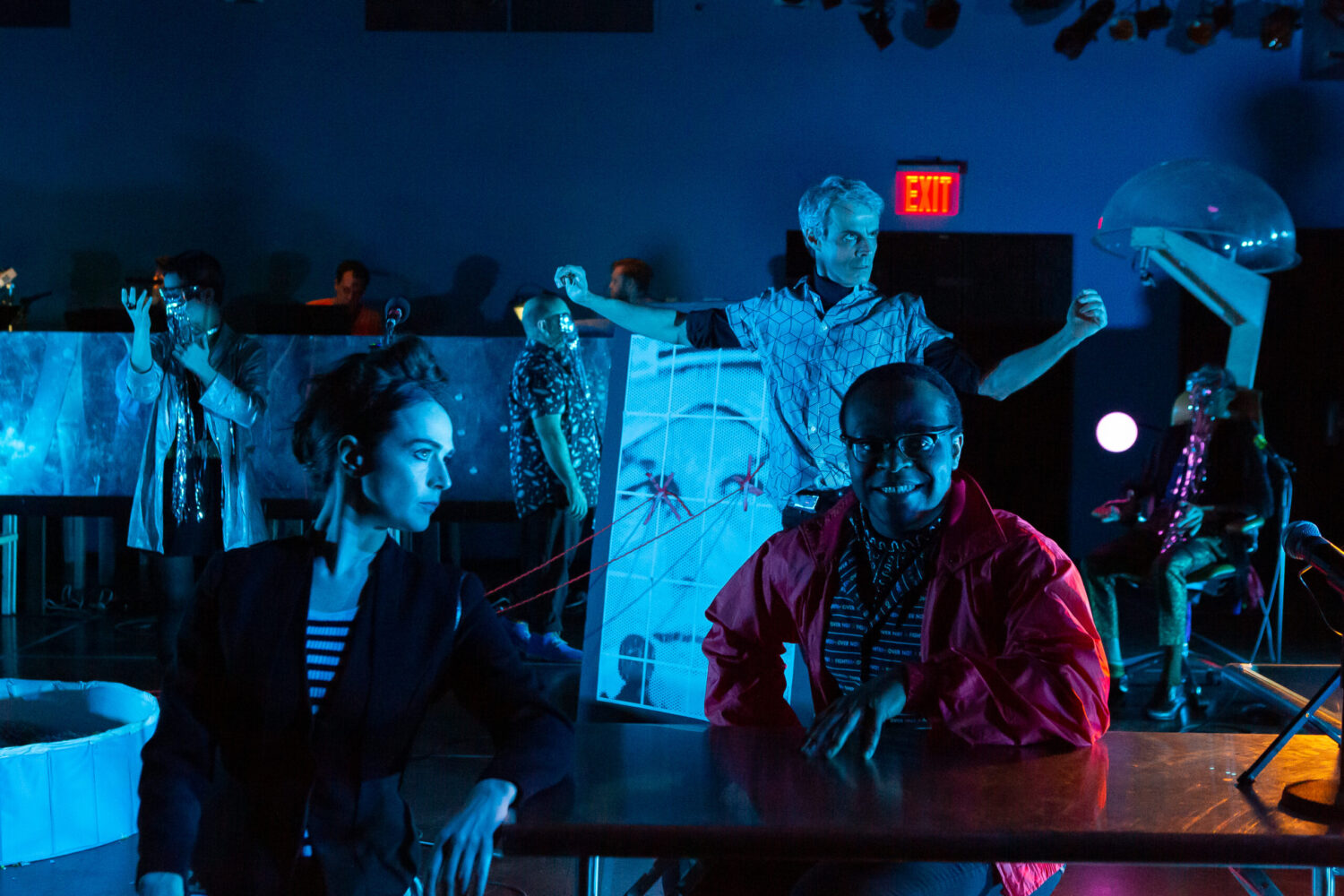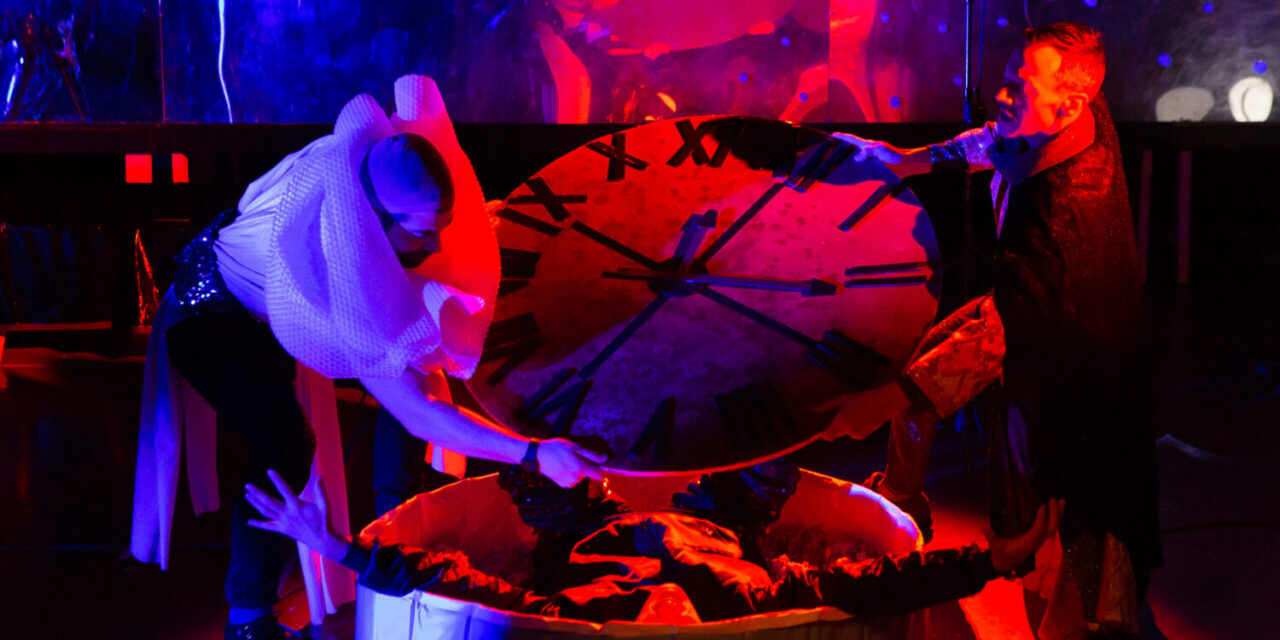With a smattering of words, carefully grouped to alert the scholar that collectivism and collaboration go hand in hand, Object Collection sparked some new ideas with You Are Under Our Space Control, inviting the spectator to consider the importance of space and the wicked world beyond.
“I began to recompute for the comet, with observations of Cambridge and Washington, today. I have had a fit of despondency in consequence of being obliged to renounce my own observations as too rough for use.”
–You Are Under Our Space Control
While ideas on the page, like the ones above from Kara Feely, are a starting point, they are really a map to creating the dramatic action. Object Collection wants you to engage in the work – See it. Sense it. Make the experience of viewing your own.
Superbowl Sunday was a perfect day to do this. While so many crowded around their TV, I traveled to one of my favorite theaters, La MaMa ETC, located at 66 East 4th Street, to see a team of performance artists that I hadn’t seen in five years. Traveling back in time can be a difficult struggle, with some pathways absolutely refreshed, while others treading so deeply that their traces are undeniable.

Photo Credit: Hunter Canning
“Culture is so wigged out, debased, abstracted from its own centers…or re-approaching with all the maimed, tawdry self-conscious desperations of the converted, inducted, signed on…”
-You Are Under Our Space Control
Time travel is difficult. You get the sense that Object Collection created You Are Under Our Space Control after researching astral projection, cryogenics, and, of course, 1950s television. Dark, occult leanings are made humorous with the addition of slinkies around the eyes, perfectly placed helmets, sequins wraps, and black and white striped pants. A thin performer sits under an egg, or is it an enormous hairdryer? They create their own dome, under which to perform their feat of magic. Direction by Kara Feely really allows you to see each part separately, appreciating each snippet of performance and momentary interaction. A whirling globe, covered by bits of torn paper, is projected on sides of the stage. The video never takes away from the width of Peiyi Wong’s set design, with the total stage picture adding in parts slowly.
On the stage, each performer of the ensemble (Steven Ali, Avi Glickstein, Yuki Kawahisa, Annie Kunjappy, Alessandro Magania, Daniel Allen Nelson, Nicolás Noreña and Fulya Peker) takes their space. Nicolás Noreña holds the large clock. He is dwarfed and Christ-like under the weight of Time, holding his fate and his future. Alessandro Magania provides stellar movement sequences, designed to slow the flow of an otherwise tumultuous world.
Object Collection believes in so much going on at once, and while You Are Under Our Space Control features noisy, desperate music, the visuals are so gosh-darned appealing that you never let your inner critic find too much fault with the spectacle. Rock music, composed by Travis Just, performed with electric guitar, keyboard, and live drums, can be commanding, forthright, and dominant. We believe in the pure sounds of Avi Glickstein, as forcefully as we believe in the strong gaze of Fulya Peker. The world is harsh, yet there are moments of awe and wonder. Some beats have an exactitude and a clarity that is unstoppable. Other moments open to a dreamy world where there is quiet space to ask: is what we perceive real or imaginary? Is knowing so different than feeling?
The most troubling questions are left for the end of the show.
Large cue cards reveal:
“Death of Death = Life
Death of Life = Death
Life of Death =
Death of Death = Life of Life”
–You Are Under Our Space Control
The past few years may have been difficult for some, and Object Collection provides moments for reflection. Toward the end of the play, an actor softly chats about his dinner meal. Even with the weight of gravity, the possibility of being under the siege of space people, and well, the threat of the person next to you dying, it’s essential to pattern your day toward every possibility of average. The softer monologues remind one to reach out to a friend and even consider telling a joke.
The stage floods with pink smoke at the end of the show. The division between actor/ spectator becomes less defined. You wonder if you’re supposed to disappear in it. That’s the smoke, but what if there’s too much of it? Should we get lost in it?
Because I saw Object Collection’s cheap&easy OCTOBER in 2015, I am certain that the chords that sustain the weight of time will ring through.
The question to ask is: how do you calibrate the weight of what matters? And who are you, anyway?
This post was written by the author in their personal capacity.The opinions expressed in this article are the author’s own and do not reflect the view of The Theatre Times, their staff or collaborators.
This post was written by Marcina Zaccaria.
The views expressed here belong to the author and do not necessarily reflect our views and opinions.


















